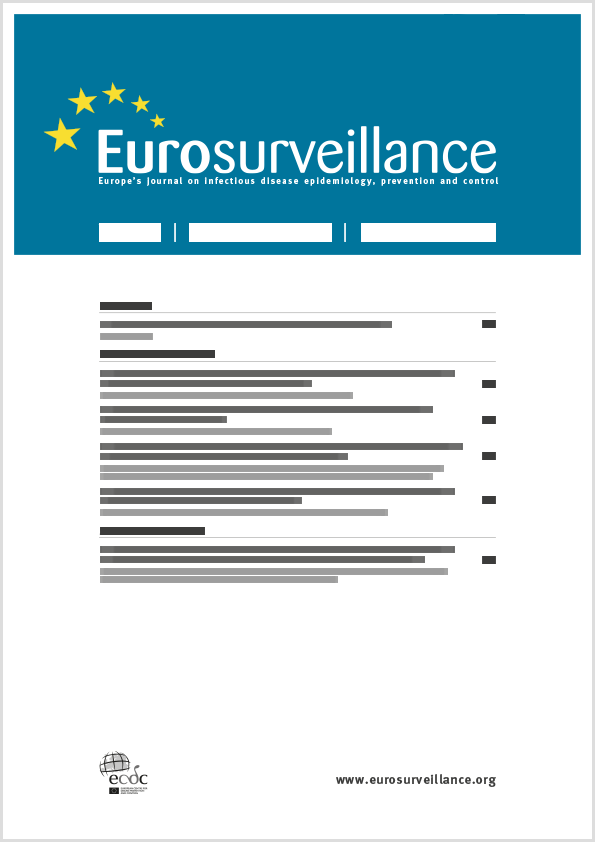- Home
- Eurosurveillance
- Previous Issues
- Volume 24, Issue 42, 17/Oct/2019
Eurosurveillance - Volume 24, Issue 42, 17 October 2019
Volume 24, Issue 42, 2019
- Rapid communication
-
-
-
The ‘Finnish new variant of Chlamydia trachomatis’ escaping detection in the Aptima Combo 2 assay is widespread across Norway, June to August 2019
More LessThe ‘Finnish new variant of Chlamydia trachomatis’ (FI-nvCT), escaping detection in the Aptima Combo 2 assay (AC2), is widespread across Norway. From June to August 2019, 84% (81/97) of available AC2/Aptima CT discordant samples from five laboratories were confirmed as FI-nvCT. Two additional CT variants (CT 23S rRNA C1514T and G1523A) also escaped AC2 detection. The high FI-nvCT proportion might indicate a long-term national spread and it cannot be excluded that FI-nvCT emerged in Norway.
-
-
-
Large outbreak of tularaemia, central Sweden, July to September 2019
More LessOn 31 of July 2019, the Public Health Agency of Sweden was alerted about an increasing number of tularaemia cases in Gävleborg, a county in central Sweden. The number of cases increased thereafter peaking at about 150 reports of illnesses every week. As at 6 October, a total of 979 cases (734 laboratory-confirmed) have been reported, mainly from counties in central Sweden. The outbreak is now considered over (as at 14 October).
-
-
-
Spatial variability in the reproduction number of Ebola virus disease, Democratic Republic of the Congo, January–September 2019
More LessThe ongoing Ebola virus disease epidemic (August 2018─October 2019) in the Democratic Republic of the Congo, has been exacerbated by deliberate attacks on healthcare workers despite vaccination efforts. Using a mathematical/statistical modelling framework, we present the quantified effective reproduction number (Rt) at national and regional levels as at 29 September. The weekly trend in Rt displays fluctuations while our recent national-level Rt falls slightly above 1.0 with substantial uncertainty, which suggests improvements in epidemic control.
-
- Top
-
- Outbreaks
-
-
-
International travel as source of a hospital outbreak with an unusual meticillin-resistant Staphylococcus aureus clonal complex 398, Denmark, 2016
More LessIn May 2016, an unusual outbreak with the Panton-Valentine leukocidin-positive human variant of meticillin-resistant Staphylococcus aureus (MRSA) clonal complex 398 occurred among mothers and infants in the maternity unit of a Danish hospital. MRSA sharing genotypic and phenotypic characteristics was confirmed in 36 cases, including 26 patients, nine household members and a healthcare worker (HCW) who had contact with all the patients. The national MRSA database contained 37 seemingly unlinked MRSA cases whose isolates shared the same genotypic and phenotypic characteristics as the outbreak strain. Whole genome sequencing showed that three of these isolates clustered together with the 36 outbreak isolates, suggesting spread outside the hospital. The HCW and 21 of 37 cases from the national MRSA database had links to south-eastern Asia, where the outbreak strain is endemic. These findings suggest that the HCW acquired the outbreak strain while travelling in south-eastern Asia and then introduced it into the hospital; from there, it spread within the patients’ households and into the community. Screening of travellers returning from countries with high levels of MRSA could be an important intervention to prevent spread of these bacteria into hospitals via patients or HCWs.
-
- Top
-
- Surveillance
-
-
-
Burden of varicella complications in secondary care, England, 2004 to 2017
More LessBackgroundStrategies to control varicella vary across Europe. Evidence from established programmes has prompted the United Kingdom to re-evaluate the need for universal vaccination. The burden of complicated varicella is a key parameter in the cost-effectiveness analysis.
AimOur objective was to estimate the burden of complicated varicella in England.
MethodsThis electronic health record surveillance study used data from all NHS hospitals in England to identify varicella admissions between 2004 and 2017. The incidence of pre-defined complications of varicella was estimated using ICD-10 codes. Inpatient costs were calculated based on the payment rules for providers of NHS services.
ResultsThere were 61,024 admissions with varicella between 2004 and 2017 and 38.1% had a recognised varicella complication. Incidence of hospitalisation increased by 25% and the proportion with complicated varicella by 24% from 2004/05 to 2016/17. The most common complications were bacterial skin infections (11.25%), pneumonia (4.82%), febrile convulsions (3.39%) and encephalitis (2.44%). Complication rates were higher in older age groups and the type of complications more severe. Length of stay for complicated varicella was 3.1 times longer than for uncomplicated varicella and inpatient costs were 72% greater.
ConclusionComplicated varicella has a substantial health and economic burden. These data together with data on impact on quality of life are important in informing the cost-effectiveness analysis of universal varicella vaccination.
-
-
Volumes & issues
-
Volume 30 (2025)
-
Volume 29 (2024)
-
Volume 28 (2023)
-
Volume 27 (2022)
-
Volume 26 (2021)
-
Volume 25 (2020)
-
Volume 24 (2019)
-
Volume 23 (2018)
-
Volume 22 (2017)
-
Volume 21 (2016)
-
Volume 20 (2015)
-
Volume 19 (2014)
-
Volume 18 (2013)
-
Volume 17 (2012)
-
Volume 16 (2011)
-
Volume 15 (2010)
-
Volume 14 (2009)
-
Volume 13 (2008)
-
Volume 12 (2007)
-
Volume 11 (2006)
-
Volume 10 (2005)
-
Volume 9 (2004)
-
Volume 8 (2003)
-
Volume 7 (2002)
-
Volume 6 (2001)
-
Volume 5 (2000)
-
Volume 4 (1999)
-
Volume 3 (1998)
-
Volume 2 (1997)
-
Volume 1 (1996)
-
Volume 0 (1995)
Most Read This Month

-
-
Detection of 2019 novel coronavirus (2019-nCoV) by real-time RT-PCR
Victor M Corman , Olfert Landt , Marco Kaiser , Richard Molenkamp , Adam Meijer , Daniel KW Chu , Tobias Bleicker , Sebastian Brünink , Julia Schneider , Marie Luisa Schmidt , Daphne GJC Mulders , Bart L Haagmans , Bas van der Veer , Sharon van den Brink , Lisa Wijsman , Gabriel Goderski , Jean-Louis Romette , Joanna Ellis , Maria Zambon , Malik Peiris , Herman Goossens , Chantal Reusken , Marion PG Koopmans and Christian Drosten
-
- More Less


